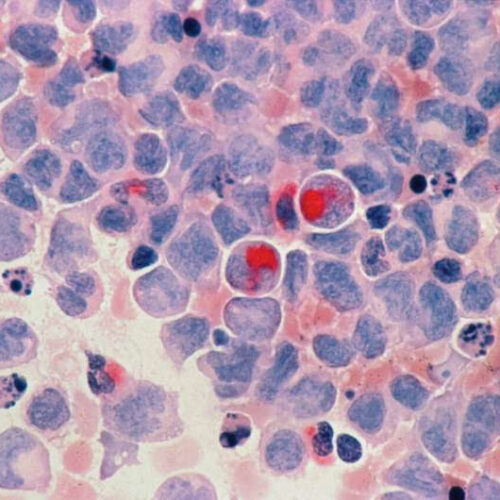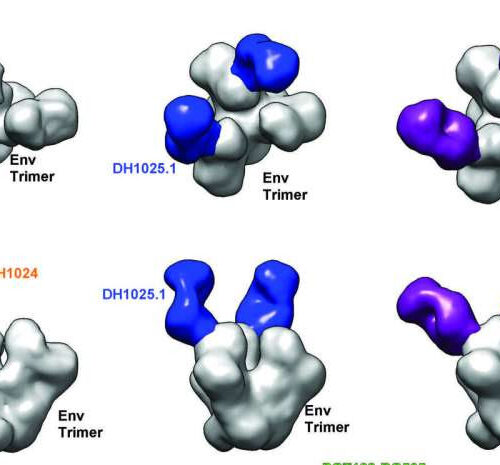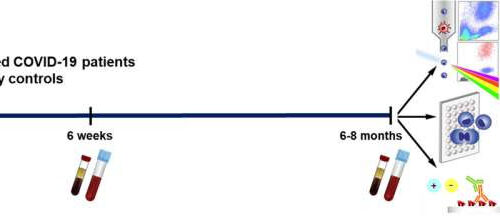by Champalimaud Centre for the Unknown Credit: Unsplash/CC0 Public Domain The statistics for pancreatic cancer are sobering. With a five-year survival rate of only 9%, incidence of the most common type, pancreatic ductal adenocarcinoma (PDAC), is growing and projected to be the second cause of cancer deaths by 2030. Surgery remains the most effective treatment,...
Vaccination for HIV shows promise in rhesus macaques
by Bob Yirka, Medical Xpress 3D reconstructions of images of the vaccine-induced antibodies DH1024, DH1025.1, and DH1027 bound to CH505 SOSIP Env trimers. Credit: K. Saunders, et al, Science Translational Medicine (2022) A team of researchers affiliated with several institutions in the U.S. has developed a vaccine for HIV that shows promise in rhesus macaques. In their...
Putting liquid biopsies on solid ground: Cancer diagnosis from a milliliter of blood
by Weizmann Institute of Science Different patterns of epigenetic markers revealed by EPINUC on blood nucleosomes (bright-red dots) of a healthy person (left) and a colorectal cancer patient (right). Credit: Weizmann Institute of Science Blood tests—simple, noninvasive and economically feasible—promise to become the next major milestone in cancer diagnosis. However, most of these tests, dubbed...
Why does fasting reduce seizures?
by Children’s Hospital Boston Graphical abstract. Credit: Cell Reports (2022). DOI: 10.1016/j.celrep.2022.111278 Calorie restriction has long been associated with reduced seizures in epilepsy. New research from Boston Children’s Hospital helps explain how fasting affects neurons in the brain and could lead the way to new approaches that would avoid the need for fasting or restrictive diets. The...
New study identifies how memory of personal interactions declines with age
by University of Maryland School of Medicine PDE11A memory enzyme (green) in the brains of young (left) and old (right) mice. Credit: University of Maryland School of Medicine One of the most upsetting aspects of age-related memory decline is not being able to remember the face that accompanies the name of a person you just...
Severe COVID-19 impairs the immune system for longer than 6 months
by Linköping University Graphical outline of the study. Peripheral blood was collected from patients with COVID-19 that needed hospitalization (N=46) and healthy controls (N=31). Clinical parameters were measured at enrollment, and the levels and effects on peripheral immune cells and neutralizing antibodies were assessed at enrollment, 2 weeks, 6 weeks, and 6-8 months. The phenotype...
Researchers identify a potential path against inherited neurological disease
by The Mount Sinai Hospital Researchers at the Icahn School of Medicine at Mount Sinai and NCATS identified compounds that reversed the effects of several neurodegenerative diseases called lysosomal storage disorders (LSDs) in patient cells and mice. LSDs are characterized by genetic defects that prevent the cell’s lysosomes from breaking down and recycling fats, sugars...
Experimental drug shows promise against lupus
by Denise Mann An experimental drug that has been shown to treat rashes in people with lupus may also help with lupus-related joint pain. Affecting as many as 1.5 million people in the United States, lupus is an autoimmune disease in which the body’s immune system misfires against its own joints, skin, brain, lungs, kidneys and blood...
Metabolic markers could give clues for brain hypertension
by University of Birmingham Credit: Pixabay/CC0 Public Domain Patients who suffer from a form of raised brain pressure could have their condition identified earlier thanks to new metabolic clues, new research has found. A new study in Neurology published today looked at the metabolism of people who experienced Idiopathic Intercranial Hypertension (IIH), a common condition characterized by...
Gut microbes may lead to therapies for mental illness, study reports
by UT Southwestern Medical Center Credit: CC0 Public Domain The role of the microbiome in intestinal and systemic health has garnered close attention among researchers for many years. Now evidence is mounting that this collection of microorganisms in the human gut can also impact a person’s neurological and emotional health, according to a recent perspective...









